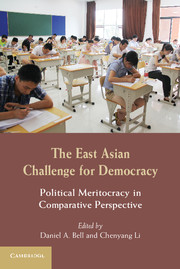Book contents
- Frontmatter
- Dedication
- Contents
- Contributing Authors
- Acknowledgments
- Introduction
- Section I The Theory of Political Meritocracy
- 1 Political Meritocracy and Meritorious Rule
- 2 A Confucian Version of Hybrid Regime
- 3 Confucian Meritocracy for Contemporary China
- 4 The Liberal Critique of Democracy
- 5 Meritocratic Representation
- Section II The History of Political Meritocracy
- Section III Realizing Political Meritocracy Today
- Index
- References
2 - A Confucian Version of Hybrid Regime
How Does It Work, and Why Is It Superior?
Published online by Cambridge University Press: 05 June 2014
- Frontmatter
- Dedication
- Contents
- Contributing Authors
- Acknowledgments
- Introduction
- Section I The Theory of Political Meritocracy
- 1 Political Meritocracy and Meritorious Rule
- 2 A Confucian Version of Hybrid Regime
- 3 Confucian Meritocracy for Contemporary China
- 4 The Liberal Critique of Democracy
- 5 Meritocratic Representation
- Section II The History of Political Meritocracy
- Section III Realizing Political Meritocracy Today
- Index
- References
Summary
FOUR PROBLEMS WITH DEMOCRACY
The majority of people all over the world may still believe that liberal democracy is the best possible regime, the “end of history,” as Francis Fukuyama's famous book title suggests. When faced with challenges indicating problems with democracies, the more informed tend to appeal to the famous retort allegedly made by Winston Churchill: “Democracy is the worst form of government, except for all those other forms that have been tried from time to time.” Clever as it seems, this claim may be a sign of our intellectual laziness, because it lacks empirical and theoretical support. Empirically, in controlling corruption, making sound long-term economic policies, decreasing ethnic violence, and choosing leaders that are competent and represent the true will of the people, democracies, especially in the developing world,do not always or clearly do better than nondemocracies.
Theoretically, in my view, there are four problems with democracy, especially its institution of one person, one vote. First, the contemporary mainstream ideology behind one person, one vote, especially in today's America, is the belief in the power of the people, and, by implication, the suspicion of the power of the elite and even the power of the government. This belief often degenerates into, or resonates with, a radical form of individualism that celebrates narrowly defined self-interests above all else. As a result, for example, in American politics, a candidate often has to present oneself as an average Joe (or Jane) and as an antiestablishment figure; at the same time, he or she must portray the opponent as a member of the elite and of the establishment. When a ruling branch of a government consists of “simple folks” who despise government (i.e., themselves), it is hard to imagine that this branch will turn out to be respected, even by the people who put them there. This is probably why
the US Congress – in principle, the most representative of political institutions – scores at the bottom of most surveys asking Americans which institutions they most respect, whereas the Supreme Court, the armed forces, and the Federal Reserve system (all appointed rather than elected bodies) score highest.
- Type
- Chapter
- Information
- The East Asian Challenge for DemocracyPolitical Meritocracy in Comparative Perspective, pp. 55 - 87Publisher: Cambridge University PressPrint publication year: 2013
References
- 19
- Cited by



